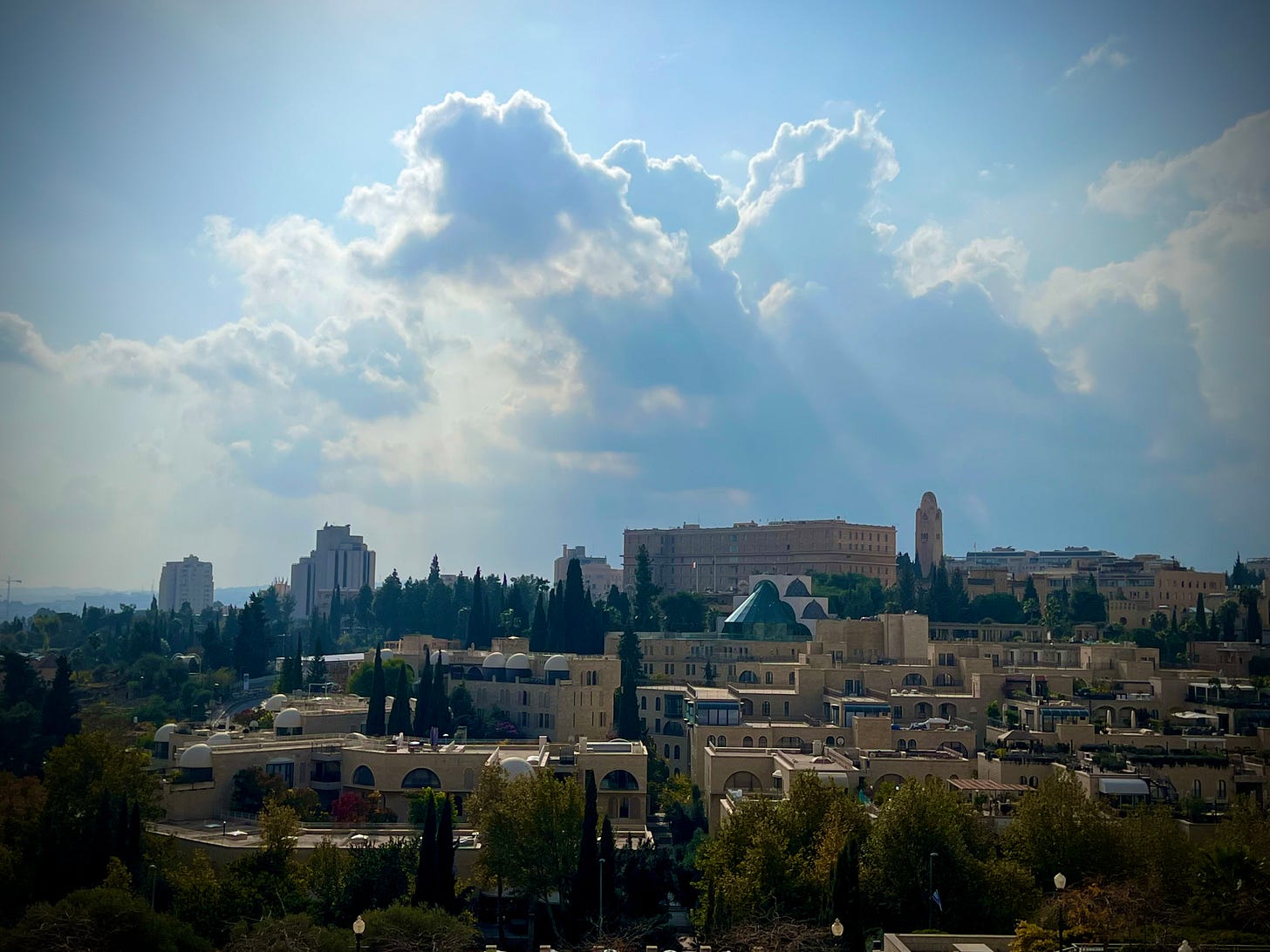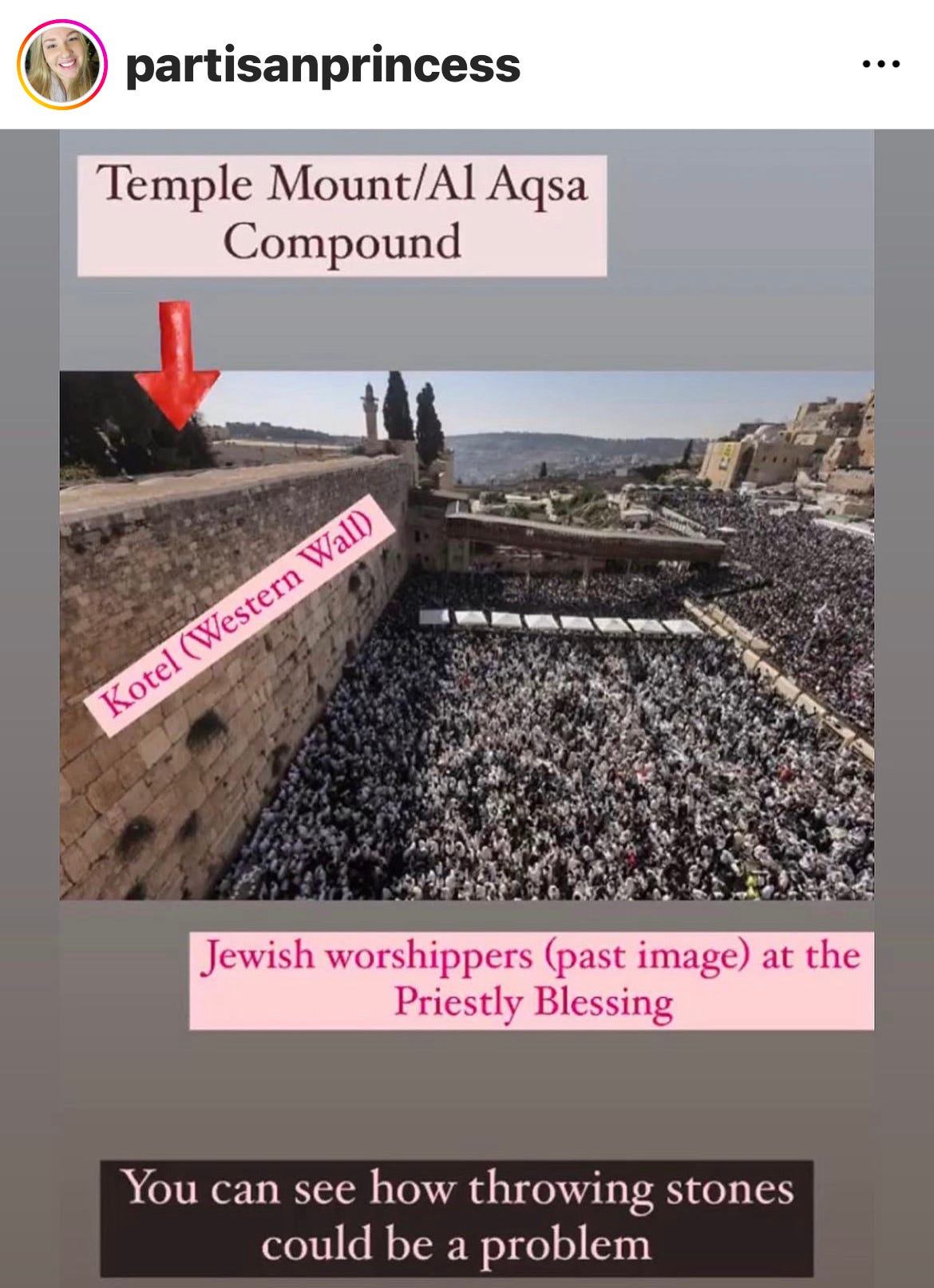Optimism For Israel — And Democracy
It can be hard to remain optimistic in the face of political polarization and violent antisemitism. But it's not impossible.
On Thursday, April 6, in the largest attack from Hezbollah-controlled Lebanon since the 2006 war, Hamas fired 34 rockets from southern Lebanon toward northern Israel and launched 44 rockets and anti-aircraft missiles from Gaza toward southern Israel. Rockets were launched from Syria, too, and landed in Israel and Jordan. In response, Israel hit Hamas’s attack tunnels and weapons-manufacturing sites as well as targets in southern Lebanon and Syria. IDF reserves are being called up in preparation for larger-scale military operations.
The cycle began with young Muslim men barricading themselves inside the Al Aqsa Mosque in an attempt to stay overnight, with stockpiles of fireworks and rocks (which some claim are created by chiseling the walls and/or floors of the mosque). The Jordanian Waqf (the Islamic trust), which controls matters inside the compound, does not permit overnight stays during the week except for the last ten nights of Ramadan. And “worshippers should not barricade themselves inside the mosque and places of worship with weapons and explosives” says the UAE's foreign ministry.
The Al Aqsa Mosque, Islam’s third holiest site, was built on top of the Temple Mount, the most sacred and oldest Jewish religious site. Jews pray at the Western wall of the Temple below the Al Aqsa compound, but while non-Muslims are allowed (during visiting hours) to visit the Temple Mount where the Al Aqsa compound stands, they are not permitted to pray there. To many Muslims, the mere presence of a Jew on the Temple Mount constitutes defilement and is therefore a provocation. (That this kind of thinking has become accepted by non-Muslims is another matter.)
In advance of the violence on the Temple Mount, some Israeli religious extremists allegedly encouraged Jews to sacrifice goats on the Temple Mount — a reenactment of an ancient Passover ritual that hasn’t been practiced since Biblical times. (This did not occur.) The alleged intention of those who barricaded themselves in the mosque, attempting to stay the night, was “to create a violent riot particularly against the Temple Mount visitors [i.e. Jews] in the morning hours,” according to Israeli police, who entered the mosque to evacuate the young men.
Reports indicate police fired rubber bullets and tear gas into the mosque. Videos of the ensuing violence are troubling. They appear to show police beating Palestinians amid a barrage of explosions. Twelve Palestinians were reportedly injured and dozens arrested.
In response, rockets. And on the ground, terrorists attacked Israelis and tourists.
Two British-Israeli sisters Maia Dee (20) and Rina Dee (15) and their mother Lucy Dee (48) were shot to death. Rabbi Leo Dee, the husband and father of the victims, told Israeli press that 20 bullets from a Kalashnikov rifle were found in his daughters. His wife, who was shot twice, was found comatose, airlifted to a hospital, and died days later. Hamas spokesman Hazem Qassem praised the attack as “retaliation for the crimes committed by Israel in the West Bank and the Al Aqsa Mosque.”
A 35-year-old Italian man, Allesandro Parini, was killed when a man from Kfar Qassem, an Israeli town, rammed his car into a crowd of pedestrians in Tel Aviv. At least seven others were injured, some of them tourists. The driver was shot and killed by police. A local group in Kfar Qassem issued a statement condemning the attack, saying “this is not the way of the residents of Kafr Qassem. The city was and remains a place for living together and pursuing peace.”
Iran, a designated State Sponsor of Terrorism, supports various terrorist groups, including Hamas, the ruling body of Gaza. Terrorist rule makes life unbearable for those who live under it, as the subjects of a series of animated film shorts, Whispered in Gaza, attest.
Palestinians in Gaza are under a communications blockade. But as a result of these films, produced by the Center for Peace Communications, their voices have reached the Islamic Fatwa Council (IFC), which issued an Islamic Fatwa against the terror organization. Charging Hamas with “violating the laws of the Holy Quran and teachings of the Noble Prophet Mohammad (Peace be Upon Him),” the IFC announced that Muslims should not “pray for, support, finance or fight on behalf of Hamas,” which, the IFC declared, is “responsible for racketeering, extortion, the use of child soldiers, and falsely accusing Palestinians of treason.”
During this time of increased terrorist violence targeting Jews and Israel, it can be challenging to remember the humanity of those indoctrinated to believe both anti-Jewish conspiracy theories and a false history, leading them to accept a murderous mission. “I don’t want my children to be exposed to that indoctrination,” one woman in Gaza says. “I want them to think rationally.” Another participant told filmmakers, “I now understand that [Hamas] jails are full of honorable people. Anyone who tries to think for himself winds up there.”
As I recently wrote for the Jewish Journal:
Only 7% of Gazans surveyed say conditions there are positive. Yet those who disagree with Hamas’s message or methods, or simply ask for better living conditions, are labeled “traitors” and “Zionist collaborators.” In other words, there’s no way to tell how many of the Palestinians in the videos depicting the celebration of terrorism are there because they support such attacks and how many are there merely to protect themselves and their families from Hamas.
The animated films illustrate how profoundly unfree Gazan Palestinians are, under Hamas.
Meanwhile, political polarization in Israel does not bode well for its national security — at least according to Israeli Defense Minister Yoav Gallant, whom Netanyahu fired last month, but then changed his mind. In March, “for the sake of our security, for the sake of our unity,” Gallant implored, “it is our duty to return to the arena of dialogue.”
If the Exodus from Egypt has taught Jews anything, it is that being free is hard. It requires the habits of mind Judaism attempts to inculcate. Among them, the resilience to begin again after each exile, and the antifragility to learn anew how to thrive; the curiosity to adapt to new customs and cultures, and the fortitude to remain Jewish in each new land; the humility to never be too certain, and the courage to question, debate, and dissent; the kind-heartedness to “love your neighbor as yourself” and the radical compassion to “befriend the stranger.”
In the Talmud, there is a story of a rabbi who, regarding a matter of Jewish law, disagreed with all the other rabbis in his community. The other rabbis all agreed that they were right and he was wrong. Nonetheless the dissenting rabbi was unpersuaded and continued to argue until even his presence became so unpleasant that the other rabbis excommunicated him.
They expected their lives to become more peaceful, but instead, all manner of troubles befell them. You might think that their misfortunes were because the lone rabbi was right and everyone else was wrong. But that is not what the story is about. It is about the importance of machloket — argument.
With increasing violence and threats of a new intifada in Israel, antisemitism at record levels in the U.S., chants of “globalize the intifada” across the country, and widespread protests against the Israeli government among Jews inside Israel and beyond, it can be challenging to remain optimistic. Yet, perhaps what appears to be a destructive fracture among Israelis is in reality the beginning of a series of essential discussions — conversations that involve debate and dissent, curiosity and compassion, and an opportunity for machloket l'shem Shamayim: Argument for the sake of Heaven.
We could give that a try ourselves.
More to come…





